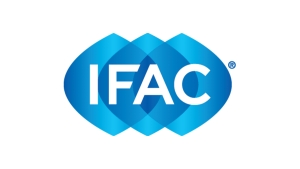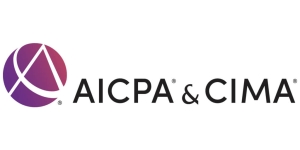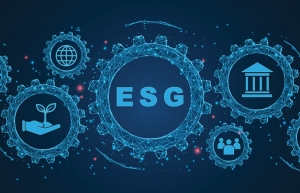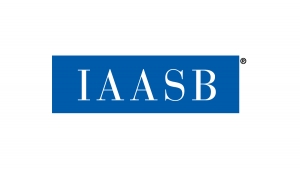عرض العناصر حسب علامة : معايير الاستدامة
الاتحاد الدولي للمحاسبين يشيد بإصدار أول معيارين للاستدامة من ISSB
بصفته الصوت العالمي لمهنة المحاسبة، دعم الاتحاد الدولي للمحاسبين منذ فترة طويلة إنشاء مجلس معايير الاستدامة الدولية (ISSB)
تطلق Oxford و AICPA و CIMA برنامج شهادة في مجال الاستدامة
تتعاون AICPA و CIMA اللتان تشكلان معًا رابطة المحاسبين المهنيين المعتمدين الدوليين، وكلية Saïd للأعمال بجامعة أكسفورد لتقديم برنامج شهادة الإدارة التنفيذية في الاستدامة لمحترفي المحاسبة والمالية.
معلومات إضافية
-
المحتوى بالإنجليزية
AICPA & CIMA, which together form the Association of International Certified Professional Accountants, and the University of Oxford's Saïd Business School are partnering to offer an executive management certificate programme in sustainability for accounting and finance professionals.
"Simply put, this exciting collaboration will help to improve the world we live in," Soumitra Dutta, Dean of the Saïd Business School, said in a news release announcing the programme. "With our school's world-class teaching, we will equip accounting and finance professionals across the globe with the skills and knowledge they need to better focus businesses on their social and environmental impact. I cannot imagine a more important time for such a programme, as we all face the very real dangers of the growing climate crisis."
The programme, scheduled to launch later this year, is designed for mid- to senior-level accounting professionals, such as CFOs, chief accounting officers, and board members. It will be taught online through live classes, giving participants access to Oxford faculty members with expertise in sustainability issues, and will provide an unparalleled opportunity to develop a global network of contacts, the release said.
"As we move closer to global sustainability standards, there is high demand for accounting and finance leaders who can successfully navigate this dramatic shift to greater organisational transparency beyond traditional financial metrics," said Andrew Harding, FCMA, CGMA, AICPA & CIMA's CEO–Management Accounting. "Our new programme will give key players in this transformation the skills they need to build trust with stakeholders and provide consistent, comparable information to develop strategies and shape decisions related to sustainability."
Graduates of the programme will earn a certificate jointly signed by Oxford Saïd and AICPA & CIMA, and they also will benefit from a dynamic and impactful global alumni network — the Oxford Saïd Elumni Network.
The programme is intended to:
Equip aspiring professionals with subject matter expertise, insight, and practical knowledge to support and lead their organisation's response to sustainability issues;
Alert employers and prospective employers that certificate holders possess a deep understanding of how sustainability issues affect their organisation's ability to create long-term value, with relevant implications for decision-making and resource allocation; and
Deepen a professional accountant's ability to apply business skills to sustainability issues, which will have a profound effect on organisational business models.
According to the release, AICPA & CIMA and Oxford Saïd plan to explore other joint executive management programmes relating to management accounting and the future of finance.
التعريف بمستقبل محاسبة الاستدامة
معلومات إضافية
-
المحتوى بالإنجليزية
Introducing the Future of Sustainability Accounting: ESG
What is sustainability accounting? What is Environmental, Social and Governance (ESG)? And how can accountants benefit from it?
Awareness of social and environmental impacts of businesses is growing. Investors are seeking businesses that can evidence their corporate sustainability. Social awareness and fairness are dictating consumer behaviour. Meanwhile, transparency in how organisations are governed is being demanded by employees and customers alike.
All these factors have inspired the need for businesses to report on their non-financial performance. This is where accountants can help. Having a skillset in analysis, reporting and independent advice, means accountants are in the perfect position to assist businesses in their sustainable development.
But where do accountants start? In this article we explore sustainability accounting standards of ESG and how accountants can get more information.
An introduction to sustainability accounting
Sustainability accounting is the reporting of non-financial information as a result of an organisations performance. Typically this focuses on the social and environmental impacts and performance of a business.
The purpose of sustainability accounting is to help generate value in an organisation that is not necessarily directly tied to financial reporting.
Sustainability accounting can trace it's history back to the 1970s. This is when organisations began to start looking at the social and environmental impacts of their businesses. Albeit during this time period, sustainability accounting reporting was not well defined.
It took until the late 1990s to early 2000s, after wider philosophical discussions within the sector - as well as numerous social and environmental movements - for sustainability accounting to be defined.
And with this definition, came further research, literature, training programmes and the development of standards.
Sustainability accounting has a distinct benefit for accounting firms. As more and more firms begin to understand and report on their sustainable activities and impacts, they will be seeking independent advice. There is no reason this type of independent reporting can't be conducted by accountants.
Accountants already have the skills and experience to report independently. This independence can help prevent 'greenwashing' in non-financial reporting. Accountants reporting on sustainability can help businesses benefit from sustained practices. Whether that's through employee retention, customer satisfaction, better energy consumption or reduced waste.
Understanding the value of sustainability reporting
To understand the value of sustainability reporting, you have to understand how it differs from financial reporting.
At its most basic, financial reporting looks at documenting and communicating financial performance. This is through income statements, balance sheets and cashflows. The purpose is track and analyse business performance through financial incomings and outgoings.
Sustainability reporting, on the other hand, looks at the non-financial performance of a business. Specifically, its environmental impacts, social performance and governance.
But, where is the value of reporting on non-financial information for businesses?
Understanding how a business can be more sustainable has two leading benefits.
Firstly, identifying opportunities where a business can be sustainable, can have a positive impact on financial performance. For example, tracking energy usage or waste production with the aim of reducing it, can see a positive financial gain for businesses. Similarly, a business that explores its diversity performance, can introduce new ideas, viewpoints and ways of working that can have positive impacts.
Secondly, through a sustainability accounting system, a business can add more to society than just its financial impact. Combating environmental issues, having positive social impacts and operating a business with fair governance are concerns that impact everyone globally. Whilst a business accounting for these areas may not directly impact the bottom line, they do impact on whether the business itself operates in an economy that is favourable for it.
The rise in popularity of ESG
ESG is a term used to monitor three pillars of sustainability and responsibility of a business outside of financial performance.
Sustainability accounting through ESG helps businesses report on wider range of issues. This, in turn, can encourage consumer confidence through greater understand of the social responsibility impact a business has.
But the need for ESG and sustainability reporting is growing not just from a social or even political demands. Investment decisions are now being made with ESG as major considerations. Indeed, investors and investment companies are taking notice of what the sustainable development of organisations are now. And the growth of importance in ESG for making investment decisions is rapid.
Source: 2020 EY Climate Change and Sustainability Services (CCaSS) Institutional Investor Survey.
Investors are becoming more concerned about how ESG impacts business models.
There are multiple reasons for this growth in concern. Firstly, there is the global environmental issues, as well as a rise in awareness for social justice and fair governance. Meaning there is wanting from investors to work with businesses that practice corporate sustainability.
But, secondly, there is also a case of investors wanting to be ahead of the curve in relationship to potential political changes. Indeed, the EU has already implemented directives that call on companies with over 500 employees to disclose their sustainability accounting in management reports. And indeed recent proposals by the SEC in the US will also see ESG reporting become mandatory for large businesses.
Ultimately, the rise in ESG is coming from business first. With the political demand coming second. And whilst regulation is currently focused on larger businesses, there is no reason small and medium size businesses can't also start looking at their sustainability accounting.
But what are the pillars that make up ESG? What is meant by Environmental, Social and Governance? And what areas make up each of the three pillars of ESG?
Environmental Factors
The impact that a business has on the environment should be accounted for within sustainability accounting.
Typically, this can include (but not limited to) reporting on:
energy usage
wastage
use of natural resources
pollution.
It is also important to report on environmental opportunities. Where can the business lessen its impact on the environmental? Opportunities should be included in any sustainability reporting.
Social Factors
Sustainability accounting also looks at how the business maintains its corporate social responsibility. This should be treated as more than social activities it does by focusing on what policies it has and the impact of actions from those policies.
Social factors can include:
diversity
product safety
human rights in supply chains
data privacy
health and safety
investment in people.
Being clear on your Social Factors with provable metrics to support them can further give a business a clear Human Resources strategy. Furthermore, having evidence of your Social Factors can help support your recruitment drives by proving to be an employer of choice.
Governance Factors
Key to producing reliable sustainability accounting is an honest and transparent reporting of corporate governance. This makes companies more accountable for their actions and helps respond to stakeholder concerns.
Reporting on Governance Factors can include:
management structure
ownership and control
representation of employees in decision making
bonus payments and compensation
pay equality across genders.
The purpose of Governance Factors is to showcase leadership accountability. Organisations reporting higher ratings of Governance transparency see less mismanagement, fewer scandals and have better reputations. This can lead to greater investor confidence as well as a more motivated workforce.
Benefits of ESG for Accountants
Sustainability accounting requires measurement and reporting in a way that carries assurance of the truth.
Being able to report ESG information in an independent capacity can help businesses be transparent with their sustainability. And this is important. Honest, transparent reporting of good quality, information that can be trusted is the only way a business can modify its behaviour for sustainable development.
Accountants are in the unique position to be able to offer this service due their existing skillsets and reputation.
With the growth of awareness in ESG, and businesses wanting to report on their sustainability, Accountants that can offer sustainability accounting create the ability to differentiate themselves from competitors.
ترحيب من IAASB و IESBA بيان دعم IOSCO لتطوير المعايير المتعلقة بضمان المعلومات المتعلقة بالاستدامة
يرحب مجلس معايير التدقيق والتأمين الدولي (IAASB) ومجلس معايير الأخلاقيات الدولية للمحاسبين (IESBA) بإعلان اليوم من المنظمة الدولية لهيئات الأوراق المالية (IOSCO) عن دعمها وتشجيعها لعمل IAASB و IESBA على تطوير المعايير المتعلقة بالتأمين.





